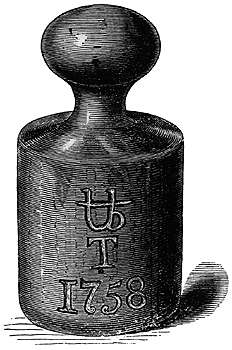Troy weight
System of units of mass used for precious metals





Troy weight is a system of units of mass that originated in the Middle Ages and is primarily used today in the precious metals industry. The system is named after the city of Troyes in France, where it was first used. The troy weight system is distinct from the more common avoirdupois system, which is used for most other goods.
Units of Troy Weight[edit]
The troy weight system includes several units:
- Troy ounce: The troy ounce is the most commonly used unit in the troy weight system. It is equal to 31.1034768 grams. The troy ounce is used to measure the mass of precious metals such as gold, silver, platinum, and palladium.
- Troy pound: The troy pound consists of 12 troy ounces, which is different from the avoirdupois pound that contains 16 ounces. The troy pound is equal to 373.2417216 grams.
- Pennyweight: The pennyweight is another unit in the troy system, equal to 1/20 of a troy ounce, or 1.55517384 grams. It is often used in the jewelry industry.
History[edit]
The troy weight system has its origins in the Roman monetary system, which used bronze bars as currency. The system was later adopted by the Medieval European merchants and became standardized in the city of Troyes, a major trading hub. The troy weight system was officially adopted in England in 1527 during the reign of Henry VIII.
Comparison with Avoirdupois[edit]
The troy weight system differs from the avoirdupois system, which is used for most everyday goods. The avoirdupois pound is heavier than the troy pound, weighing 453.59237 grams compared to the troy pound's 373.2417216 grams. However, the troy ounce is heavier than the avoirdupois ounce, which weighs 28.349523125 grams.
Modern Usage[edit]
Today, the troy weight system is primarily used in the trading of precious metals. The London Bullion Market and other major exchanges use troy ounces as the standard unit of measure for gold, silver, and other precious metals.
Related pages[edit]
References[edit]
<references group="" responsive="1"></references>
-
Troy weight gold 1 oz
-
Ingots of Ge, Fe, Al, Re, Os, one troy ounce each
-
1000 oz silver bullion bar
-
Comparison of pounds
-
Troy pound engraving
Ad. Transform your life with W8MD's Budget GLP-1 injections from $49.99


W8MD offers a medical weight loss program to lose weight in Philadelphia. Our physician-supervised medical weight loss provides:
- Weight loss injections in NYC (generic and brand names):
- Zepbound / Mounjaro, Wegovy / Ozempic, Saxenda
- Most insurances accepted or discounted self-pay rates. We will obtain insurance prior authorizations if needed.
- Generic GLP1 weight loss injections from $49.99 for the starting dose of Semaglutide and $65.00 for Tirzepatide.
- Also offer prescription weight loss medications including Phentermine, Qsymia, Diethylpropion, Contrave etc.
NYC weight loss doctor appointmentsNYC weight loss doctor appointments
Start your NYC weight loss journey today at our NYC medical weight loss and Philadelphia medical weight loss clinics.
- Call 718-946-5500 to lose weight in NYC or for medical weight loss in Philadelphia 215-676-2334.
- Tags:NYC medical weight loss, Philadelphia lose weight Zepbound NYC, Budget GLP1 weight loss injections, Wegovy Philadelphia, Wegovy NYC, Philadelphia medical weight loss, Brookly weight loss and Wegovy NYC
|
WikiMD's Wellness Encyclopedia |
| Let Food Be Thy Medicine Medicine Thy Food - Hippocrates |
Medical Disclaimer: WikiMD is not a substitute for professional medical advice. The information on WikiMD is provided as an information resource only, may be incorrect, outdated or misleading, and is not to be used or relied on for any diagnostic or treatment purposes. Please consult your health care provider before making any healthcare decisions or for guidance about a specific medical condition. WikiMD expressly disclaims responsibility, and shall have no liability, for any damages, loss, injury, or liability whatsoever suffered as a result of your reliance on the information contained in this site. By visiting this site you agree to the foregoing terms and conditions, which may from time to time be changed or supplemented by WikiMD. If you do not agree to the foregoing terms and conditions, you should not enter or use this site. See full disclaimer.
Credits:Most images are courtesy of Wikimedia commons, and templates, categories Wikipedia, licensed under CC BY SA or similar.
Translate this page: - East Asian
中文,
日本,
한국어,
South Asian
हिन्दी,
தமிழ்,
తెలుగు,
Urdu,
ಕನ್ನಡ,
Southeast Asian
Indonesian,
Vietnamese,
Thai,
မြန်မာဘာသာ,
বাংলা
European
español,
Deutsch,
français,
Greek,
português do Brasil,
polski,
română,
русский,
Nederlands,
norsk,
svenska,
suomi,
Italian
Middle Eastern & African
عربى,
Turkish,
Persian,
Hebrew,
Afrikaans,
isiZulu,
Kiswahili,
Other
Bulgarian,
Hungarian,
Czech,
Swedish,
മലയാളം,
मराठी,
ਪੰਜਾਬੀ,
ગુજરાતી,
Portuguese,
Ukrainian



